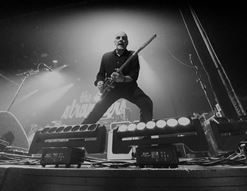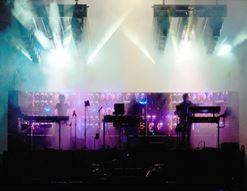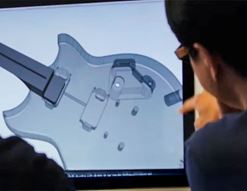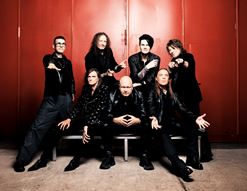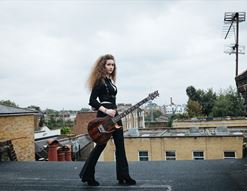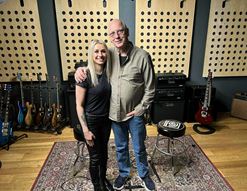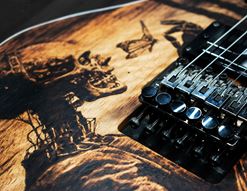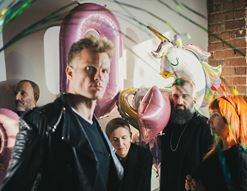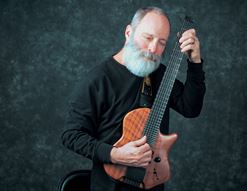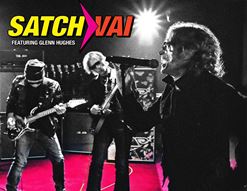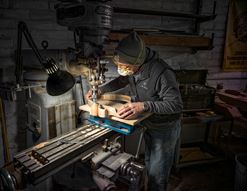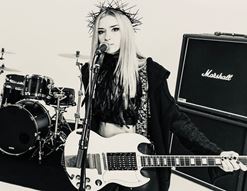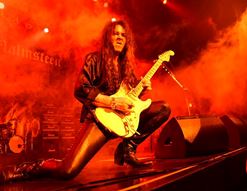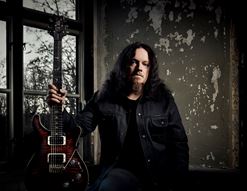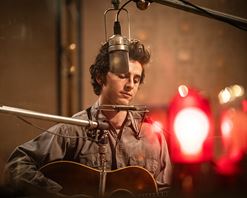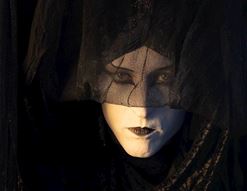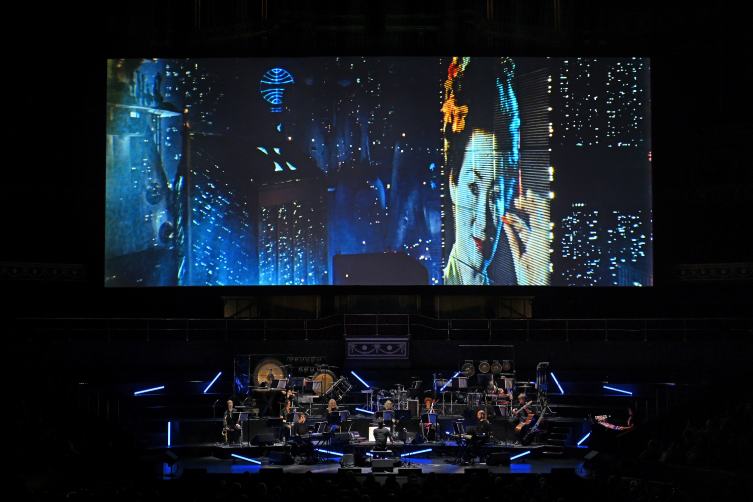
(Photo: Paul Sanders)
What are your top ten movies of all time?
For many people, Ridley Scott’s 1982 sci-fi epic Blade Runner is at the top of their list. As a hyper-stylised vision of the future, it has become arguably the most influential movie of its kind, having lost none of its richness in the 42 years that have past since its release.
Alongside the gobsmacking cityscape vistas and panoramas, a huge part of Blade Runner’s appeal is in the soundtrack. Created by Greek maestro Vangelis, the Blade Runner score is an exotic mix of ethnic/world percussion and breathtaking, iconic synthesizer tones. Indeed, it’s hard to find a keyboard made since 1982 that doesn’t offer up a few ‘close but not quite’ Blade Runner presets.
So it’s a big deal for movie fans and music fans. Imagine somebody having the idea of presenting this movie masterpiece on a huge screen, alongside live musicians recreating the score: wouldn’t that be incredible? Well, that’s exactly what is being offered in Blade Runner LIVE, an event from Avex Classics International. With the show touring the UK later this year, I reached out to Musical Director Pierre O’Reilly for a conversation about what’s involved in bringing such an ambitious undertaking to life. I wanted to know how they even started such a project, far less how they managed ot get the production pas the finish line!
Pierre proved to be an excellent person to chat to, and was happy to go into detail about most parts of the process. What was kept relatively secret were the minutiae regarding precise instrumentation. After all, it takes a ton of work to make Vangelis-worthy sounds happen in a live band context, and Avex are understandably reluctant to reveal too many secrets there! Still, you'll see as you read the piece that Pierre actually gives us loads of insights into how the sounds are recreated.
Interestingly, it seems that Pierre and Avex have reached inside my brain and found out all of my favourite movies: in addition to Blade Runner, they’ve also done live shows of Aliens and Terminator! You’ll hear about all this and more in our exclusive interview, right here…
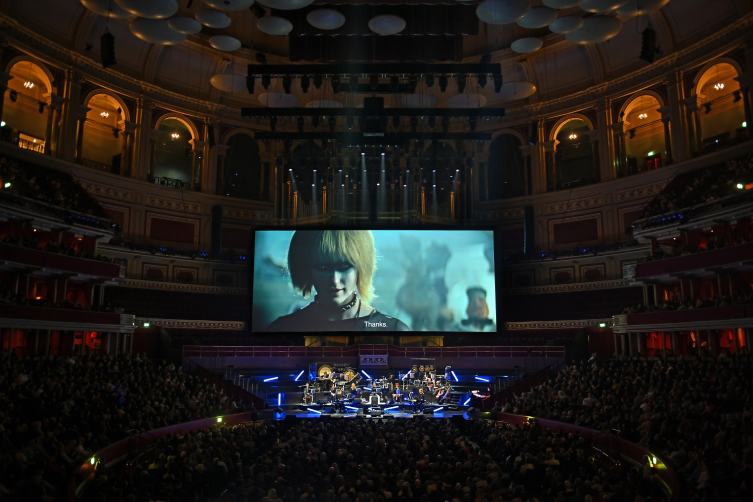
(Photo: Paul Sanders)
Pierre O'Reilly Interview
Guitarguitar: There are so many things I want to ask you about, Pierre, it's such an interesting project! We're here to talk about Blade Runner Live, but prior to Blade Runner, you had also been involved in Titanic Live and Aliens Live. These things sound incredible and I need to know: how did you even get started and involved in these projects?
Pierre O’Reilly: I can put it down to being introduced to a woman called Maggie O'Herlihy. When I moved to London to study, she was already involved with artists and management. She was approached to set up a London office for AVEX, the Japanese entertainment company, and she identified that the first thing that we should do as an office was Titanic LIVE in 2015 at the Royal Albert Hall. The film and live orchestra genre was beginning to take off: you had The Matrix, The Lord of the Rings, and it was still niche but it was definitely getting more popular. That was the first project we worked on after she secured the rights with 20th Century Fox for Titanic.
She had met the late James Horner, the composer, in 2013 and that made the process a bit more straightforward, but obviously you've still got to go through the studio and make sure that James Cameron and his team are happy. James Cameron came to the premiere along with John Landau the producer, James Horner and Sissel (Kyrkjebo) who was the original vocalist on the film.
It was a great success. We then went on to do Aliens LIVE in 2016. James Cameron came to the premiere and he brought Sigourney Weaver and Gail Anne Hurd - producer on Aliens - with him. We did two shows in one day at the Royal Albert Hall: they came out on stage after the second show and the audience just went wild (laughs). That was great.
We ended up doing other films like Amadeus - an excellent film with live with orchestra and choir, and that's actually one of our most popular titles, particularly amongst classical orchestras. It just kind of took off from there with other titles. Blade Runner was always in the back of our minds.
It's a different beast because obviously with Aliens, Amadeus and Titanic, they’re very much orchestral scores whereas with Blade Runner, you're dealing with a smaller ensemble, and you're thinking: will that translate well on a stage? And actually in hindsight, yeah, it's done really well, you know? So, we basically got the rights to do that with Warner Brothers, and there started an intense process of trying to do it justice on stage!
GG: So I'm wondering how the company decides on which films to choose? Is it just a case of blue sky dreaming - just go for the ones you really want and see if you can get the rights?
PO: I mean, it's a really good question There are numerous things that we look into and the big thing is we'll have a discussion in-house. II think what's really interesting is that, from my point of view, you find more and more, that the people go to these events more to do with the film rather than the score. You know, it's the nostalgia effect of ‘Oh, I love that film’. A lot of people that love the film, went to Aliens LIVE, but they've never heard or noticed the music before. They were like, ‘Jeez, I didn't realise the music was that epic!’ (laughs) Yeah, they recognise some really famous cues from it, but didn't realise it was that bombastic and violent in parts.
With Blade Runner, we identified that it was very much a cult film, a film that just got popular over the years. But also the music of it is probably up there: it's on the same level, in that the people who love the film, love the music equally.
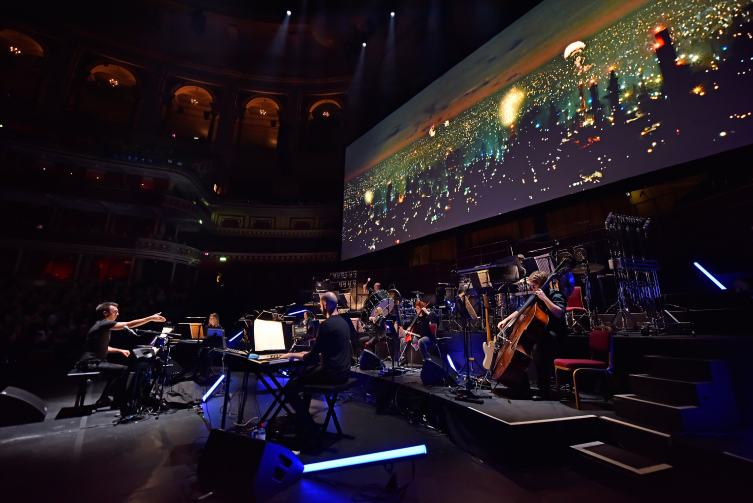
(Photo: Paul Sanders)
So, in terms of identifying what films we'll do, we'll look at a few films, we'll see if they're available, and then we'll do music analysis. We'll watch the film and what's important is the ratio of music-to-film, because you can't really present films whereby there's only 15 or 20 minutes of music to an orchestra: that's just not feasible. You kind of want to go for about 40 minutes of music minimum in a two-hour film. And that's quite low already. For example, with Avatar Live In Concert, which we're producing - the world premiere is taking place at the Royal Albert Hall in October of this year - it’s a two hours and 40 minutes film, and it has two hours and 20 minutes of music in there.
GG: Wow! Wow.
PO: There’s 20 minutes of no music! I feel sorry for the conductor! I feel sorry for the brass players. (laughs) But there we go.
GG: See with Aliens: I wonder because, you know, I grew up with Aliens, it’s such an amazing film. And it is quite an interesting thing to note that the music is very much… it's such a member of the overall ensemble experience, if I can put it like that? You can watch it 10 times and not take it in properly. I wonder - and this is going to lead back into a question a wee bit later on - but the sound design in aliens is probably as iconic as the look of the film, with the gun sounds and the alien noises and everything. Do you think people remember those sonic elements more so than the music itself?
PO: I don't know, to be honest with you, Ray. I mean, I've become more and more appreciative of the artists behind film sound design and foley. They're amazing people. It's interesting because 2016 was when we did Aliens Live, and as part of a marketing push, both Maggie and I flew over to Los Angeles to Lightstorm, Cameron's production company. I did a 45-minute interview with James Cameron, and there was one question I really wanted to ask him. It was kind of off-piste, it wasn't on the script, but I said, “How did you create the sound for the Queen Alien’s breathing?”
Because there's that scene where Ripley turns around and the Queen is just, you know, (makes alien breathing sound) and he literally said, “Oh, that was me!”
And then he proceeded to demonstrate!. He was so relaxed, he was really, really nice, because I was absolutely bricking it (laughs). This is James Cameron, you know? This guy's on a schedule, and all these people are asking for his attention left, right and centre. And he went into this whole thing about how they made the sound for the Queen Alien’s eggs opening, that sound is actually chicken meat (laughs). So, I mean, it's definitely a valid point you say about the sound design, it’s very much a huge part of that film.
GG: That’s so cool. I can understand you being a little nervous too, haha! Now, let's go to Blade Runner then, because that's the reason for us to be talking, today. I'll get quite geeky about this, I hope you don’t mind!
PO: You probably know more about it than I do, actually! (laughs)
GG: Haha! So, the movie has five different cuts available. Which one are you guys using?
PO: Yeah, it's a very interesting question. We grappled with that, but we went for the 2007 cut in the end, the Final Cut. So you don't have that voiceover and the ending. I remember when we were doing initial music analysis on the film, seeing how long it was, we were having meetings where we were like, “Okay, what are you talking about? What ending?” And it turned out that one of us was watching one version, the other one was watching the other! So it was like: okay, we need to go with one version, and it was the 2007 cut, which is - I'm not going to be controversial here - because I know some people prefer different cuts, but I think it's the better version.
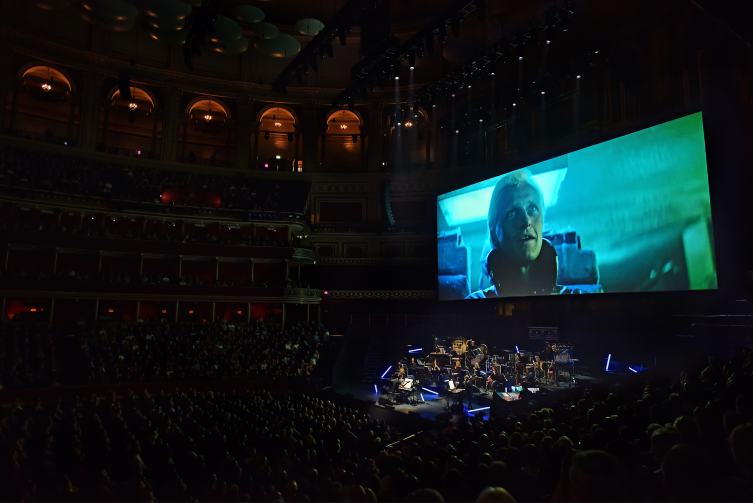
(Photo: Paul Sanders)
GG: Okay, and in regards to that, most people reading this will have their point of view on which version of Blade Runner they like, and there isn’t a voiceover on that one. The voiceover is very divisive but I'm thinking in terms of you as a musical director and someone who's having to make sense of the sonics. The voiceover at least is quite a lot of punctuation within the film, which is now missing. Was that a consideration for you whether that was going to be helpful or not?
PO: No, not really because if you think about it, back in the day there was no sort of SMPTE locking (industry standard protocol for timecode, for syncing visuals and sound - Ray), you know, a lot of those were played loosely, not necessarily to a click. So when we're making a show, when we're producing this on stage, you're kind of just like: well, it's all loose anyway, so we're going to have to get this down on paper and actually create a click track that the musicians can lock into.
So, you know, that wasn't really a concern for us. It's the 2007 version that we went for, and that was it, really, and then your biggest concern after that was: Okay, well, how do we make this work? And how do we put it on stage?
GG: I was actually going to ask you about the click tracks and whether there's like a kind of variable thing, or visual queues..
PO: The thing is, we have an amazing team of people. Ed Kalnins is an absolute genius. He was on all our shows up to pre-covid, tech director and an absolute musical wiz. And one of his favourite films is Blade Runner, so when we got the rights for this, he just jumped on it and he was in his element. He was like a kid in the candy store going, ‘how could we do this?’ He’s the guy who creates the click, who maps it out and then starts looking at how we recreate the synths on stage and all that kind of stuff. That’s along with the orchestrator, who in this case, it's John Jessensky, who is an absolute genius as well. So it's a really small team, but yeah, they're amazing.
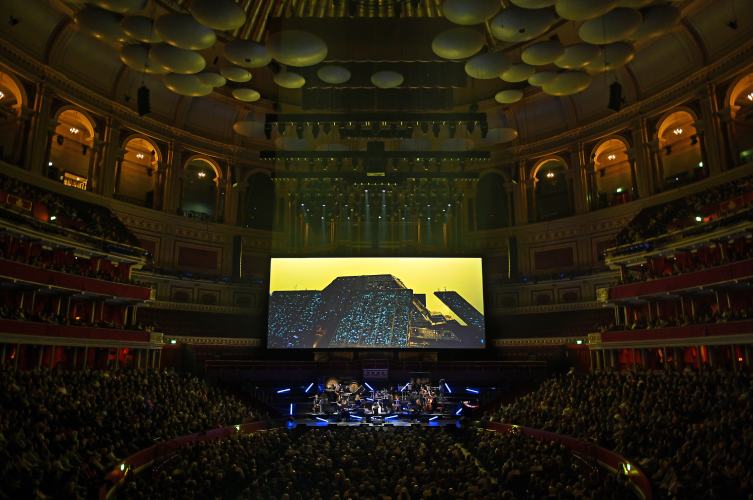
(Photo: Paul Sanders)
GG: Small but effective, yeah. So Vangelis, quite famously, when he was creating the Blade Runner score, he would look at the work print and he would just sit at his bank of keyboards and kind of semi-improvise. It was almost like it was recorded in one big take, so goes the myth, right? So what I'm thinking is, was there ever even a written score for the musicians to work from in the first place?
PO: No, so John and Ed in America, they would have taken the film, taken the stems…there were no real stems, actually, it was just separated SFX, score, and music. That was then dictated down onto a score, and then the process was you'd identify what you'd have played live and what you'd have on tape. A lot of the diegetic music (diegetic refers to what the characters in the film will hear ‘in-world’ - Ray) in the film is kept on tape because it's too complicated: the part where he's in the club, there's about three songs in one go just before he meets the snake charmer.
GG: Yeah.
PO: We were thinking ‘do we do that?’ because you know Demis Roussos’ vocals are just phenomenal, but in the end really we had to keep some of it on tape. What happens is, John then transcribes the music and then Ed at the same time is looking at the synths and the sounds of synths. Then what happens is, we ask: ‘Okay, how big is the ensemble?’ So we just need to go with an 11 piece, and you mix it up with electric and acoustic. So, you know, it's three synth players in the front of the stage. It was never feasible to have an original CS80 on tour! It's just not reliable. (Note: the Yamaha CS80 is the synth Vangelis famously used on Blade Runner and other soundtracks. It’s huge, old, goes out of tune and costs £25k to buy, IF you can find one. But WHAT a sound! - Ray) So we had to work around that. What we do is we have samplers, we have the Logic Mainstage, and we have our three sets of keyboards.
We have an electric quartet. They're also going through effects pedals. And then you have Úna Palliser on first violin, she's also doubling up on vocals, Úna’s a phenomenal musician and she nails Demis Roussos’ vocals.
GG: So you mean those vocals that are supposed to sound almost quasi-Asian in the movie and they're always in the background sort of thing right ?
PO: Yeah, and she nails that and she's a phenomenal vocalist anyway, we’ve worked with her on a few projects. The sax player doubling up on flute - and then we have two percussion players who double up on electric kit as well, and electric bass doubling up on acoustic bass. That’s the ensemble!
GG: Right, that's fantastic! When you break it down like that it makes a lot of sense, because with Blade Runner, everybody initially thinks of the huge skyscraping synths but it is actually a very percussive, airy, spacious kind of score anyway isn't it?
PO: Yes! In the percussion section there are frying pans, gamelan… there’s an array of stuff in the percussion section that might necessarily only be hit once, that's it. Done.
GG: Yeah, and is there also a visual kind of advantage to not everything being a sample: the audience can see somebody hitting that object and they go “oh, cool!”?
PO: Yeah, which was another thing: we felt like we can't just have three keyboard players onstage and maybe a drummer. It'll just look ridiculous. Also, tickets for these things are not cheap. So we want to give the audience something! I don't know what's in the water in Melbourne but they go crazy for all this kind of stuff! We did Blade Runner LIVE - they went crazy for that - and we also have The Terminator Live, which is again another visual thing. A similar setup, but instead of drums you've got taiko drums (hums the famous Terminator rhythm) and they went wild for it (laughs).
GG: For sure! Hey, do you know what? See just because you mentioned Terminator: this is a wee bit off-piste, but since it's related… there's a kind of myth or at least there's this thing online about the Terminator score versus the Terminator 2 score. On the first one, Brad Fiedel didn't have MIDI, and the time signature for the main theme is actually impossible to be properly quantized. It’s like ‘seven and a bit’, compared to T-2, which I think is in 6. Do you ever notice this?
PO: Yeah, so…(laughs) oh, this is a different can of worms! It’s not totally locked in, so the rubato on that click I think was just… I mean, we did Terminator LIVE in Lucerne, Switzerland. I played synth on that and oh my god, it’s a beast of a thing to play. The score is so much fun.
GG: Haha, ok, fair enough! We'll go back to Blade Runner! I believe you are one of the three keyboard players that aren't you?
PO: I do, if I can. I was producing the project with a colleague, Jack Stookes, and so the two of us took it and we were leading the run on that for Avex with a team, for the premiere at Royal Albert Hall in 2019.
And you know, I'll be straight up: I thought to myself, ‘man, this is such an opportunity to go into the band and play’ - because piano is my main instrument as well - and I just felt like, oh, I’ve got to play in the Royal Albert Hall! I mean, it’s the Royal Albert Hall! Some people would say ‘Nepo’ right there…
GG: Haha, no, I think that's just looking out for a good time. So, let's get down to the sounds. The CS80, the sound of the Main Title, that famous Blade Runner sound. It’s notoriously difficult to recreate. And, obviously, as we both know, a CS80 is not only going to go out of tune, but it's far too heavy to carry around, far too rare, and there are 25,000 quid if you can find one! So, what are you using instead?
PO: We're using samples. There's quite an array of samples that we're using. Arturia, using that quite a bit, especially for the CS80. Ed has all…I kind of believe like I shouldn't really disclose what he's using because he’s spent all his time sonically putting these together and building them and then putting them into Mainstage, so that when you just click over, you activate it on your keyboard and the synth sounds accordingly.
The interesting thing about any of our shows is that we tend to do a preview show which fixes any errors; we tweak stuff. For Blade Runner, when we were getting ready for the preview show, we had full two days just playing around and finessing the sounds of the synth samples and the overall ensemble.
GG: Ahhh!
PO: It's not just the synths on stage doing their thing, it's actually a hybrid sound between the strings and the real strings, electric strings.
GG: Yeah, so you're talking about like, for example, there could be somebody playing the E note on the keyboard, but somebody else is playing it on a cello and the cello is affected a certain way?
PO: Exactly, exactly, yeah.
GG: Oh, that's awesome. As someone who owns an electric cello, I'm going to experiment later, haha! Okay, so see in terms of performance: as you just mentioned, the rehearsal stage is with the band, Where normally, as you said, there's those click tracks, there might be visual cues, but on top of all that you also have this big screen with Blade Runner playing. Does that present a strange sort of situation for the musicians?
PO: To be honest with you, you don't even notice the screen. If you're talking about orchestral, it's not feasible for everybody to have a click, right? Normally the conductor’s on a click and they’ll have a visual screen monitor that has both the film and a visual click burned into it.
For the musicians on Blade Runner LIVE, there's a lot of moments whereby it's sustained notes, you could lose track of the bars, so we just give every musician a little monitor screen, and they're seeing what the conductor is seeing.
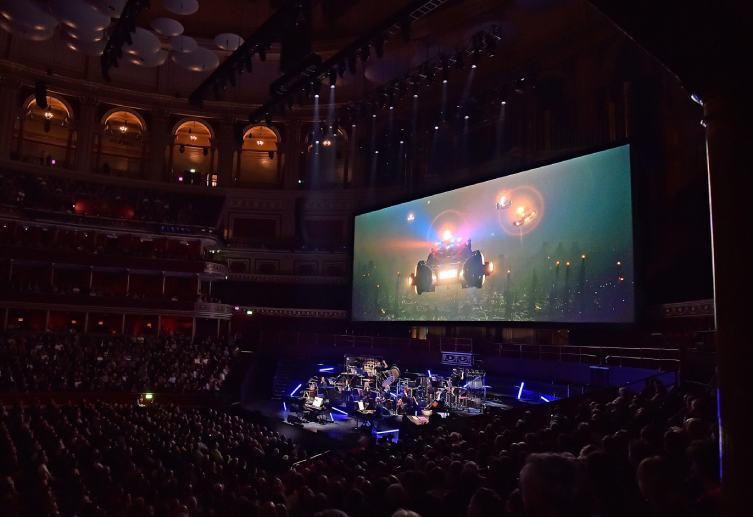
(Photo: Paul Sanders)
GG: Right, the more-electronic ones with a band, as opposed to a full orchestra.
PO: Yes, that’s it. There are so many moments where it goes down to a really slow tempo, and there are moments where one or more musicians are not playing for a prolonged period. It just makes sense that everyone on stage has their own individual screen, with the relevant click and bar info.
GG: Yeah, it’s a great idea. You've actually answered so many of the questions that I was wanting to go through, about things such as the diegetic sound, the synth setups and the sound design.
I do have two final questions, though.
PO: Absolutely, fire away!
GG: Thank you! So the first one was: after this run through of Blade Runner LIVE - and you've kind of already answered it by saying Avatar - but I was going to say do you have other movies in mind to tackle? So, given that you're already tackling Avatar, is there another film that you’d love to have a shot of after?
PO: Yes but unfortunately I can’t say anything! (laughs) We’re always looking ahead, we discuss the project and then three years later it will get its premiere.
And also, it's an issue of venues and their availability? If you look at a place like the Royal Albert Hall, they don't have a lot of availability until maybe a year or 18 months down the line. We try to do our world premieres at the Hall if we can, because it's worked really well for us and we have a good partnership with them.
I'm currently developing a project for Avex that's very different to what we've been doing- I think it's exciting. We're constantly trying to evolve and see what we can do and what audiences want.
GG: Yeah, that's not a bad way for any professional to sort of judge things: it's like, what are folk going to come and see, right?
PO: Yeah, exactly.
GG: So, before I get to the last question, it might be quite nice to slightly fill in some of the details about things like: does it matter to you or to the musicians about things like controller keyboards? This may be me being a little bit of a geek, but on the likes of CS80, there was that ribbon controller that allowed the real time filter sweep that really brought those sounds to life. So do you have requirements that way?
PO: Yeah, on those MIDI controllers, they're fully weighted, 88 keys, mammoth things, and you've got your left hand side toggle switches, but underneath there’s also your sustain pedal, your volume pedal. There’s the ability to give dynamics and change sonorities and they're built into the samples. Otherwise, it's going to be so static!
GG: Exactly! It’s the opposite of what you want, you need that movement. Okay, the last question is just a comedy one for you, Pierre. Is Deckard a replicant?
PO: I don't know. What do you think?
GG: Well, since you asked me… the version of the film that you guys are working with, the 2007 one? I reckon it's quite ambiguous, right?
PO: Yeah!
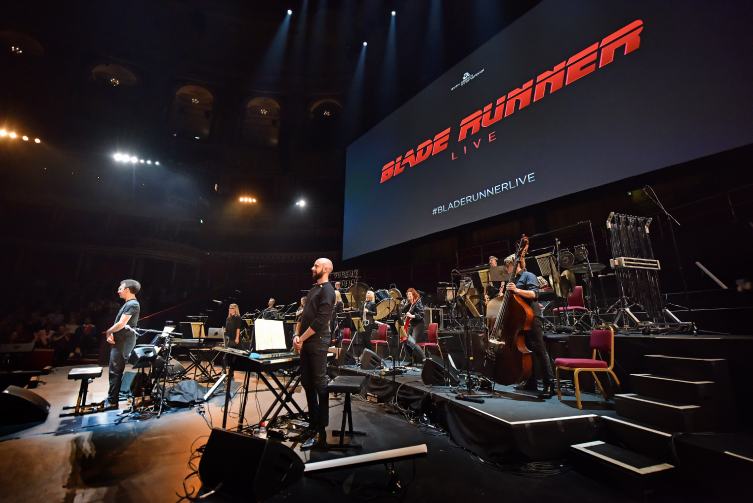
(Photo: Paul Sanders)
Does Pierre have the best job or what? The level of attention and effort that goes into these shows in quite incredible, and judging by the photos and footage shown here, it’s going to be a pretty spectacular evening. If you want to experience it first hand, head across to the London and Glasgow sites (more shows in other cities are available too) and grab your tickets. Even if you’ve seen Blade Runner loads of times, you’ve never seen it like this! For everyhrting else that Pierre and Avex are up to, head across to the Avex Classics International website.
My thanks to Pierre for finding time in his busy schedule to chat to me. And for the record, Deckard is definitely not a replicant!

